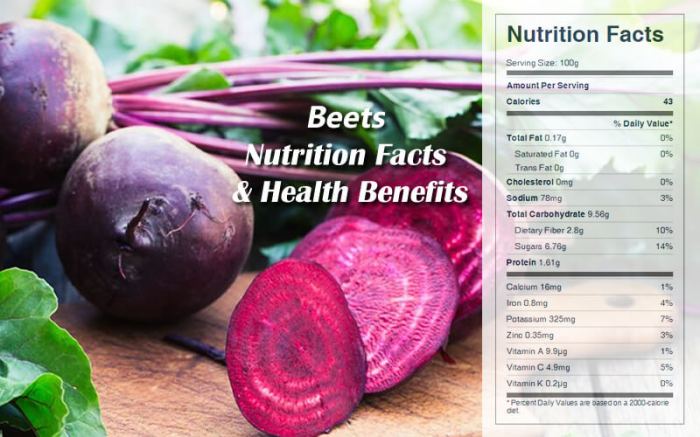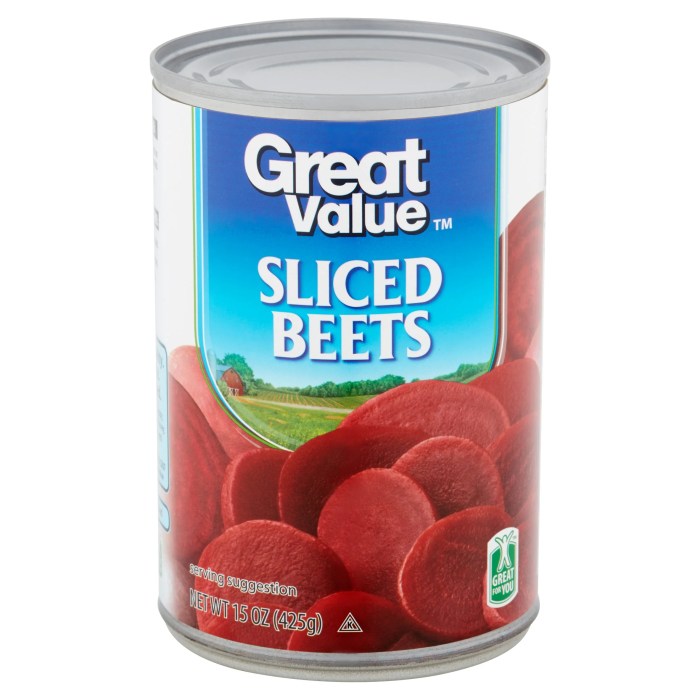Nutritional Composition of Canned Beets

Canned beets nutrition facts – Hey, fellow Bali vibes seekers! Let’s dive into the surprisingly awesome nutritional profile of canned beets – a healthy and convenient addition to your tropical-inspired diet. Think of them as the ultimate “good-for-you” snack, packed with goodness even after processing.
Canned beets are a surprisingly good source of nitrates, beneficial for blood pressure. But if you’re looking for a caffeine kick alongside your healthy eating, you might check out the rebel hard coffee nutrition facts to see how it fits into your diet. Then, you can compare the nutritional profiles and decide which better complements your overall health goals, remembering that canned beets offer a solid dose of vitamins and minerals.
Macronutrient Content of Canned Beets
Canned beets offer a decent balance of macronutrients, contributing to your daily energy needs without weighing you down. Here’s a breakdown per typical serving (about 1 cup):
| Nutrient | Amount per Serving | % Daily Value | Units |
|---|---|---|---|
| Carbohydrates | 10g | 4% | grams |
| Protein | 2g | 4% | grams |
| Fat | 0g | 0% | grams |
Micronutrient Content of Canned Beets, Canned beets nutrition facts
Beyond the macronutrients, canned beets are a treasure trove of vitamins and minerals. These contribute to various bodily functions, keeping you feeling your best. Check out this nutrient breakdown:
| Nutrient | Amount per Serving | % Daily Value | Units |
|---|---|---|---|
| Vitamin C | 5mg | 6% | milligrams |
| Folate | 20mcg | 5% | micrograms |
| Potassium | 300mg | 7% | milligrams |
| Manganese | 0.3mg | 15% | milligrams |
| Iron | 1mg | 6% | milligrams |
| Vitamin K | 8mcg | 7% | micrograms |
Nutritional Differences: Canned vs. Fresh Beets
While fresh beets boast slightly higher levels of certain vitamins and minerals due to minimal processing, canned beets retain a significant amount of nutritional value. The canning process can lead to some nutrient loss, particularly water-soluble vitamins, but canned beets still offer a substantial contribution to a healthy diet, especially considering convenience and longer shelf life. Think of it as a practical compromise for busy lifestyles.
Nutritional Comparison: Canned Beets vs. Other Vegetables
Let’s compare canned beets to other common veggies to get a clearer picture of their nutritional standing. This table shows a general comparison; the exact values can vary depending on the specific vegetable and preparation method.
| Vegetable (1 cup serving) | Calories | Fiber (grams) | Vitamin C (mg) | Potassium (mg) |
|---|---|---|---|---|
| Canned Beets | 40 | 2 | 5 | 300 |
| Carrots | 50 | 2 | 8 | 200 |
| Spinach | 7 | 2 | 10 | 160 |
| Green Beans | 40 | 4 | 8 | 190 |
Health Benefits Associated with Canned Beet Consumption: Canned Beets Nutrition Facts

Hey, fellow Bali vibes seekers! Let’s dive into the awesome health perks of those vibrant canned beets – way beyond just a pretty pink addition to your salads. Think of them as little nutritional powerhouses, packed with goodness that can seriously boost your well-being. From keeping your heart happy to upping your game in the gym, canned beets have got your back (and your blood flowing!).
Canned beets, despite the processing, retain a significant portion of their nutritional value, offering a convenient and readily available source of various health-promoting compounds. These benefits stem primarily from their rich content of nitrates, antioxidants, and essential vitamins and minerals. Let’s explore how these contribute to improved health and well-being.
Nitrate’s Role in Blood Flow and Oxygen Utilization
The magic behind many of beets’ health benefits lies in their high nitrate content. Your body converts these nitrates into nitric oxide, a molecule that acts as a powerful vasodilator, widening your blood vessels. This improved blood flow means more oxygen gets delivered to your muscles and organs, leading to enhanced athletic performance and improved cardiovascular health. Think of it like this: smoother, more efficient plumbing for your body.
Studies have shown that consuming beetroot juice, and by extension, canned beets, can significantly lower blood pressure and improve exercise endurance. For example, a study published in the journal “Hypertension” showed a significant reduction in systolic blood pressure after beetroot juice consumption in participants with hypertension.
Impact on Blood Pressure and Cardiovascular Health
High blood pressure is a major risk factor for heart disease and stroke. The nitric oxide produced from the nitrates in beets helps relax and widen blood vessels, reducing the pressure on your arteries. This can contribute to lower blood pressure levels, reducing the risk of cardiovascular complications. Regular consumption of canned beets as part of a balanced diet can be a simple yet effective way to support cardiovascular health.
Imagine your heart singing a happy song, thanks to those delicious beets!
Antioxidant Properties and Protection Against Chronic Diseases
Beets are also brimming with antioxidants, natural compounds that combat harmful free radicals in your body. These free radicals are linked to cellular damage and the development of chronic diseases like cancer and Alzheimer’s. The antioxidants in beets help neutralize these free radicals, offering potential protective effects against these diseases. It’s like having a tiny army of defenders protecting your cells from harm.
Benefits for Different Age Groups and Health Conditions
The benefits of canned beets extend across various demographics and health situations. While individual responses may vary, here’s a glimpse of the potential advantages:
- Athletes: Improved endurance and performance due to enhanced oxygen utilization.
- Older Adults: Support for healthy blood pressure and reduced risk of cardiovascular diseases.
- Individuals with Hypertension: Potential for lowering blood pressure naturally.
- Those seeking to improve overall health: A boost in antioxidant intake and support for a healthy cardiovascular system.
FAQ Corner
Are canned beets as healthy as fresh beets?
While some nutrients might be lost during canning, canned beets still pack a nutritional punch. Just look for low-sodium options!
Can I eat canned beets every day?
Totally! But moderation is key, just like with any food. Mix it up with other veggies to get a balanced diet.
What’s the best way to store opened canned beets?
Keep ’em in an airtight container in the fridge for up to a week. They’ll still be good, but might not be as vibrant.
Are canned beets good for weight loss?
They’re low in calories and high in fiber, so they can totally help you feel full and satisfied. But they’re not a magic bullet for weight loss – a balanced diet and exercise are still key!
